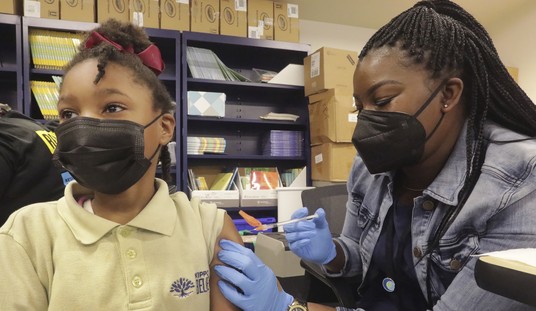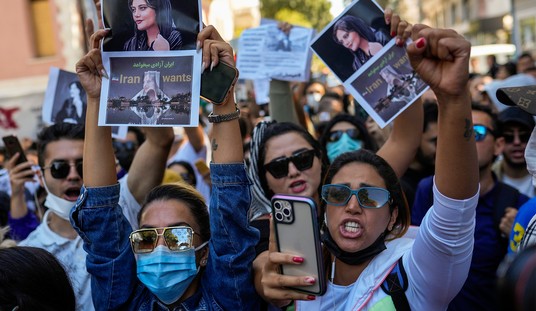For Republicans, Wednesday will be a very special day indeed, my friends.
At long last, the Day of Recriminations is nigh:
Trump gets support from 49 percent of likely Republican primary voters — followed by Cruz at 34 percent and John Kasich at 13 percent. If that margin in Indiana holds on Tuesday, Trump would be on a glide path towards obtaining the 1,237 delegates he needs to win the Republican nomination on a first ballot at the GOP convention in July…
The NBC/WSJ/Marist poll was conducted April 26-28 — so mostly after Trump’s six-consecutive primary victories in Northeast and Mid-Atlantic states, as well as after Cruz and Kasich announced an alliance/truce, whereby Kasich wouldn’t campaign in Indiana to help Cruz (in exchange for Cruz not campaigning in Oregon and New Mexico).
But 58 percent of likely Republican primary voters in Indiana say they disapprove of Cruz and Kasich teaming up to beat Trump in the Hoosier State, while 34 percent say they approve of the move.
No other poll of Indiana has showed Trump that far ahead, but he leads comfortably in (almost) every survey and it’s entirely possible that his lead has begun to widen as undecided Hoosiers make up their minds. The other newsy number from the poll is, of course, the evidence that the Cruz/Kasich alliance has backfired, but even if you could force Kasich out of the race and redistribute his voters by second choice, Trump still wins easily:
https://twitter.com/AaronBlake/status/726808852193271809
What does this mean for the rest of the primaries? Read this post from a few days ago for the delegate math. Assuming Trump wins New Jersey and takes most of West Virginia’s delegates, both of which are almost sure things, he’d need something like 130-150 delegates combined from Indiana and California to hit 1,237. Given how well he’s been polling in blue states, it’s possible that he’ll win 150 in California alone; there are 172 at stake there and it’s winner-take-all by district, so Cruz and Kasich would have to win at least eight districts statewide to hold him below the target number — even if he gets nothing from Indiana. If instead Trump wins Indiana, which would likely net him somewhere between 45 and all 57 delegates, he may go into California on June 7th needing fewer than 100 of the 172 delegates in play. Cruz and Kasich would need to win half the state’s districts or more to stop him despite the fact that the momentum in the race is entirely on Trump’s side and many anti-Trumpers in the party leadership are throwing in the towel. Cruz needs to win Indiana just to have a fighting chance of stopping Trump in California. If he can’t, why bother fighting to the bitter end?
Team Cruz is asking themselves the same question, per Politico:
In interviews, several aides, speaking on the condition of anonymity, expressed growing alarm that Cruz would lose Indiana’s primary on Tuesday — an outcome that would be a major blow to his hopes of holding Trump below the 1,237 delegates needed to clinch the GOP nomination on the party convention’s first ballot. The aides concede that, without a win in an Indiana primary where 57 delegates are at stake, Cruz’s shot at the nomination would significantly narrow…
Within the campaign, some are turning to the question of what’s next. One senior aide said there had been no discussion about dropping out before the final primary contests are held on June 7 but noted that Cruz wouldn’t be eager to prolong a campaign he was convinced he couldn’t win…
Cruz is also likely to face growing pressure from party leaders, many of whom are eager to begin the process of uniting a divided party ahead of what will be a challenging general election. In recent days, several state party chairs have held private discussions about rallying behind Trump if he wins on Tuesday.
This is what it looks like when the last resistance to a presumptive nominee finally begins to collapse. It’s not just party chairs who are whispering about swinging behind Trump: The NYT is out with a story this morning about how some of the delegates that Cruz is claiming to have won at state conventions lately aren’t as solidly behind him as he might think. The more momentum shifts to Trump, the more likely it is that soft Cruz supporters will shift to Trump too in the name of party unity behind the presumptive nominee. I’ll stick with my prediction from earlier this week for now. Cruz won’t drop out on Tuesday night if he loses but any sign after that that he’s about to lose one of the “gimme” states that are still on the board for him — Nebraska on May 10th, Montana and South Dakota on June 7th — will probably be the final straw. I wonder, in fact, what’ll happen if we get a couple of polls late this week showing Trump up in Nebraska. Will Cruz hang in there for the primary or will he take those polls as a sign that it’s all over and quit beforehand? If he does end up losing Nebraska, I think he’ll pull the plug immediately afterward. It’s very hard right now to see how we end up with a contested primary in California six weeks from now.
We’ll have plenty to busy ourselves with during the Day(s) of Recriminations following Indiana as Cruz figures out what to do. To start the fun off early, enjoy this series of tweets by Jay Cost about the complete collapse in Republican leadership in opposing Trump and Trumpism. His starting point is Mike Pence’s lame endorsement of Cruz last week (which Trump, predictably and understandably, is now laughing about), but it’s a party-wide failure; in fact, given Mitch Daniels’s stunning silence in Indiana this week, Pence isn’t even the guiltiest Hoosier. We’ll spend the rest of the year and then a decade or two after that debating why the institutional GOP didn’t put up more of a fight, but one deep truth is the theory proposed by Carl Cannon and Jeff Blehar, among others — namely, that Republican politicians had more to fear long-term from the “Cruz model” than the “Trump model” of insurgencies. Trump had the right message at the right time with the right kind of celebrity and a preternatural savvy about how to dominate media coverage, all of which combined to give him an advantage over professional outfits like Cruz’s that rely on tight organization and sophisticated data analysis. And yet, if a few things had broken differently in the campaign, he still might have found himself shut out on the first ballot in Cleveland. “Trump is sui generis,” the John Boehners of the world can tell themselves, “and he got lucky. There’ll never be another like him.”
There can, however, be other Ted Cruzes, and the more there are, the bigger the headache will be for congressional Republicans. The Cruz strategy is straightforward: Get elected to the Senate as a populist ideologue; once there, excoriate your colleagues as sellouts and disrupt whenever possible; then run for president touting your record of disruption. Cruz will end up having gone further with that approach than 15 other candidates this year, including every Republican governor who ran. His strategy can and will be replicated. Party leaders forced to choose between Trump and Cruz over the past month had to have realized that lining up behind Cruz on grounds that he’s a solid conservative and obviously more fit for office than Trump would also mean signaling to future Cruzes that they too could expect party support if they lasted long enough in a primary against an unpalatable choice. They could, in fact, even hope to become the party’s nominee for president. So most of them sat quietly while Trump advanced and now a bunch of them, like Jon Huntsman, are starting to chatter about party unity behind the nominee, all of it designed to help Trump put Cruz away. You can predict the establishment spin to come: Grassroots conservatives can’t win. Grassroots conservatives who attack their colleagues in Congress really can’t win because they’ll be starved of endorsements. Tea partiers finally had the guy they wanted running with a populist political climate nationally to propel him and they couldn’t even beat an amateur like Trump. It’s time to give up on ideologues and realize that only moderates stand a chance of being nominated, even if that moderate is himself running a populist campaign, as Trump is. The establishment can live with an insurgency like that, however reluctantly. That’s why Cruz never got support from the party, even when it was long since clear that he was the last hope of stopping Trump. Let that be a lesson to you, conservatives!








Join the conversation as a VIP Member